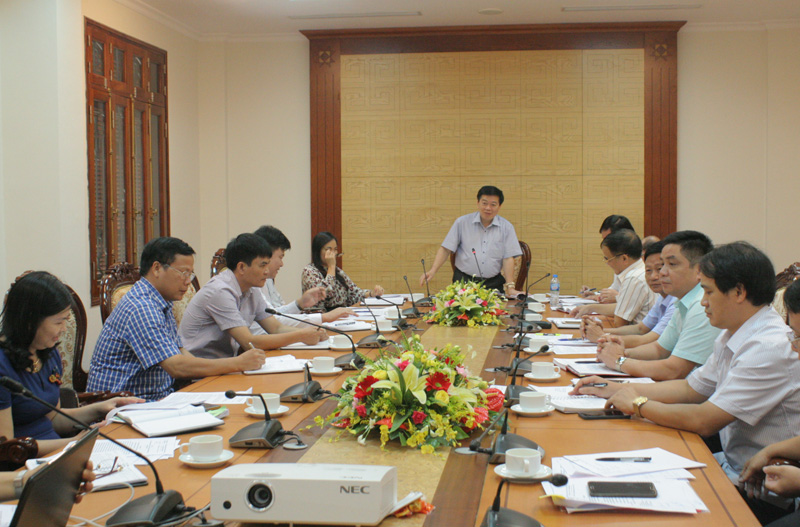
(HBO) – Hoa Binh province’s steering board for Mo Muong, cultural heritage of the Muong ethnic group, has held a meeting to review their performance in the first half of 2018 and set up tasks for the remaining months. Vice Chairman of the provincial People’s Committee and head of the steering board Nguyen Van Chuong chaired the event.
Vice Chairman of the Hoa Binh provincial People’s
Committee Nguyen Van Chuong speaks at the meeting.
According to a report at the meeting, the
provincial Party Committee’s information and education board has continued
stepping up district-level Party committees’ realisation of Directive 08-CT/TU,
dated January 20, 2016, of the provincial Party Committee’s standing board on
enhancing all-level Party committee’s leadership of the maintenance,
preservation and promotion of Mo Muong’s values in Hoa Binh.
The input method editor and teaching
documentation of the Muong language have been handed over to relevant agencies.
Meanwhile, the provincial Department of Culture, Sports and Tourism has
conducted a scientific study on Mo Muong to reprint a book on the heritage. It
has also coordinated with the provincial Department of Science and Technology
to carry out a study on Mo Muong preservation and promotion.
Additionally, the Department of Education and
Training has completed a plan on teaching the Mo Muong cultural heritage to
high school students in Hoa Binh. Press agencies like Hoa Binh, Nhan dan, and
Van nghe newspapers and the province’s radio-television station have published
a number of reports and stories on the values of this heritage. Localities
across Hoa Binh have also carried out many activities to protect and bring into
play Mo Muong’s values.
Vice Chairman of the provincial People’s
Committee Nguyen Van Chuong affirmed that the Mo Muong heritage is very
precious. Its values have been confirmed by scientists and local residents.
Realising the importance of this cultural heritage, the provincial Party
Committee and People’s Committee have issued documents to promote preservation
and promotion activities.
He asked the Department of Culture, Sports and
Tourism to take in opinions of the steering board’s members to perfect the
content of the plan on preserving and promoting the Mo Muong cultural heritage
in Hoa Binh. The preservation projects of Cao Phong and Tan Lac districts also
need to be included in this plan, which should be submitted to the authorised
agency for approval in October 2018.
The official underlined the need to popularise
information about the heritage in a more effective manner. He also called on
specialised bodies to carry out assigned tasks in a prompt, scientific and
responsible manner to help protect and bring into play Mo Muong’s values./.
Hoa Binh province is undergoing a dynamic transformation amid Vietnam’s national digital transition. Building on Poliburo’s Resolution No. 57-NQ/TW on breakthroughs in science, technology, innovation, and national digital transformation, the province has rolled out a wide range of practical action plans. A standout initiative is the "Digital Literacy for All” movement, an effort to ensure that no one is left behind in the digital era.
Hoa Binh province is undergoing a dynamic transformation in the wake of the national digital transformation movement. Building on Resolution No. 57-NQ/TW of the Politburo on breakthroughs in science, technology, innovation, and national digital transformation, the province has implemented a wide range of practical action plans. A standout initiative is the "Digital Literacy for All” movement ambitious effort to ensure that no one is left behind in the digital age.
With a spirit of unity and proactive problem-solving, the Party Committee, the government and the people of Dong Lai Commune (Tan Lac District) have made great strides in implementing the resolutions of the 24th Party Congress of the commune for the 2020 - 2025 term. Focusing on leadership and practical actions, the commune has brought the Party’s resolutions into daily life, creating strong impacts and pushing the local development forward.
Amid the nationwide push for digital transformation, young people in Hoa Binh Province are stepping up as dynamic pioneers, applying technology to enhance Youth Union operations and expand the reach of youth-led initiatives. Through creativity and adaptability, Youth Union organizations at all levels have introduced a series of practical solutions, contributing to modern governance and community development.
In recent years, An Nghia commune, located in Lac Son district, has stepped up administrative reform, focusing on improving the quality and efficiency of its single-window service unit for receiving and processing administrative procedures. These improvements have helped create favourable conditions for local residents and organisations to handle administrative procedures, contributing to the commune’s broader socio-economic development.
The Prime Minister-approved master plan to develop the multi-use value of forests ecosystems through 2030, with a vision to 2050, aims to improve the management and sustainable use of forest resources, create jobs, increase incomes, and improve the living standards of ethnic minorities, people in mountainous and remote areas, forest workers and those living near forests.



